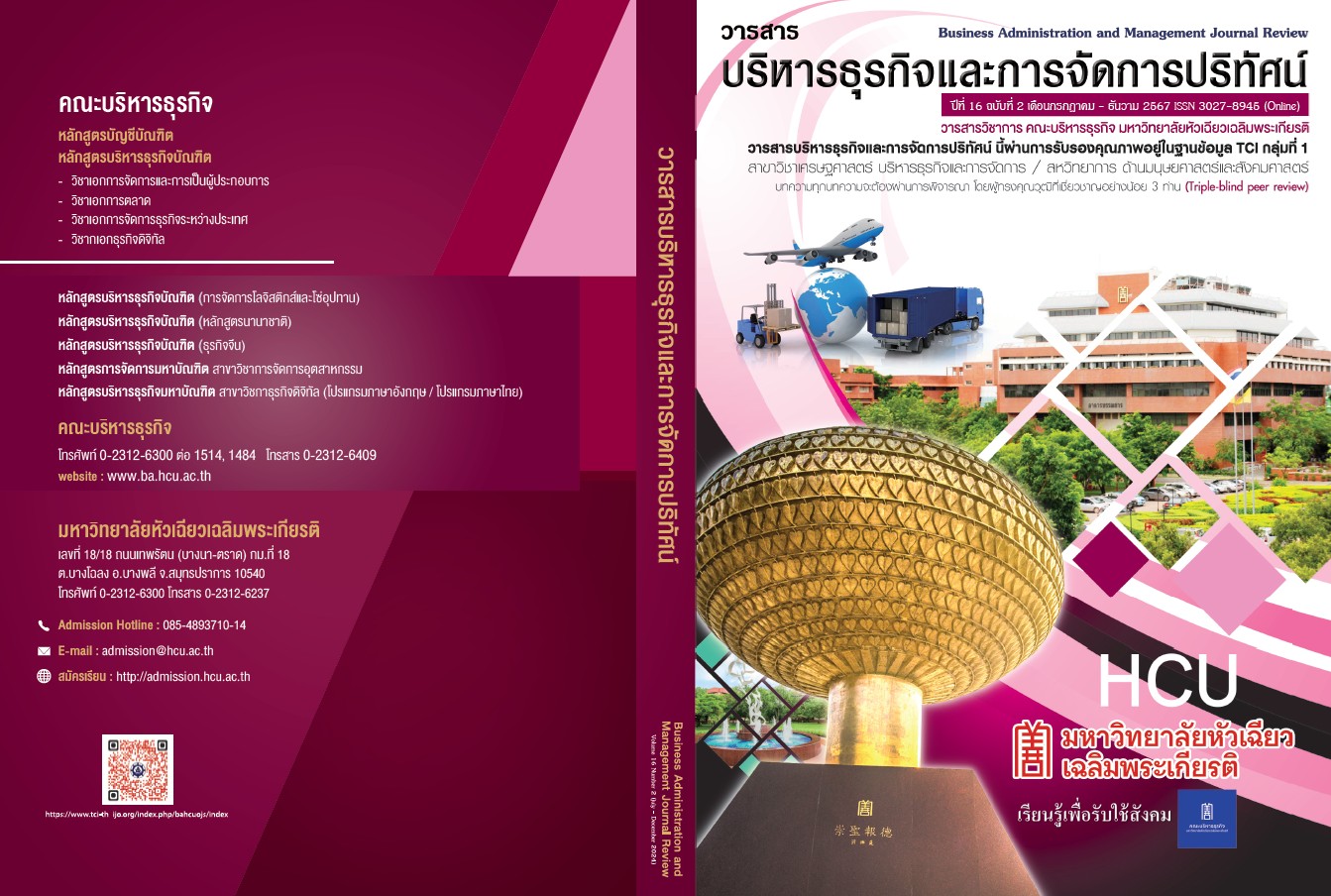Digital Business Development Guidelines for Community Enterprises: A Case Study of Food Processing Community Enterprises in Samutprakan Province
Keywords:
Digital business, Influence Factors to Digital Business, TOE, Content marketing, Community enterprise, Samutprakan ProvinceAbstract
Community enterprises have lacked of digital business skills, meanwhile customers prefer to conduct any activities online. This is because most community enterprises lack of digital business supporting factors—technologies, digital organisational and environment. The objectives of this study were to study current business of food processing community enterprises in Samutprakan province, to discover influence factors to digital business of community Enterprises and to propose digital business development framework for community enterprises. The study was qualitative research with three food processing community enterprises as cases study. There were 17 key informants who were 3 committee members and 3-4 member of the enterprises. Data were collected with in-depth interview, structure interview and observation, and analysed with classification to theme. The study found that there were 2 enterprises sold products online and all enterprises had content marketing through social media. They all had limited influence factors to digital business, especially technology regarding TOE (Technology, organisation and environment) framework. This study proposed the model of digital business development of community enterprise which 4 components—“O” or organisation was focused on digital culture, “B” was business model, “E” or environment was associated with organisations that promote digital economy and e-commerce academy and “T” or technology would be focused on e-Commerce platforms, e-Payment and content marketing.
References
กรมสรรพากร. (2560). คู่มือภาษีสำหรับวิสาหกิจชุมชน. กรุงเทพมหานคร: กรมสรรพากร.
ราชกิจจานุเบกษา. (2548). พระราชบัญญัติส่งเสริมวิสาหกิจชุมชน พ.ศ. 2548.
ลั่นทม จอนจวบทรง. (2564). ระบบสารสนเทศสำหรับวิสาหกิจ. สมุทรปราการ: มหาวิทยาลัยหัวเฉียวเฉลิมพระเกียรติ.
สำนักงานเลขาธิการสภาผู้แทนราษฎร. (2561). การส่งเสริมและพัฒนาวิสาหกิจชุมชนจากภาครัฐ. กรุงเทพมหานคร: สำนักงานเลขาธิการสภาผู้แทนราษฎร.
สำนักงานพัฒนาธุรกรรมอิเล็กทรอนิกส์. (2563). รายงานผลการสำรวจพฤติกรรมผู้ใช้อินเทอร์เน็ตในประเทศไทย ปี 2563. สำนักงานพัฒนาธุรกรรมอิเล็กทรอนิกส์ กระทรวงดิจิทัลเพื่อเศรษฐกิจและสังคม
สำนักงานพัฒนาธุรกรรมอิเล็กทรอนิกส์. (2565). รายงานผลการสำรวจพฤติกรรมผู้ใช้อินเทอร์เน็ตในประเทศไทย ปี 2565. สำนักงานพัฒนาธุรกรรมอิเล็กทรอนิกส์ กระทรวงดิจิทัลเพื่อเศรษฐกิจและสังคม
Abernethy, J. (2012). The complete idiot’s guide to Social media marketing (2nd edition). New York: Penguin Group.
Alford, J. 2016. “Co-Production, Interdependence and Publicness: Extending Public Service-Dominant Logic.” Public Management Review, 18 (5): 673–691. doi:10.1080/14719037.2015.1111659.
Atkinson, K., Axtell, B., Diop, S., Divine, E.E.G., Fellows, P., Mchomvu, H., Oti-Boateng, P., Sobano, R., Wanjau, R. and Zulu, R. (2001). Opportunities in food processing a handbook for setting up and running a small food business. Wageningen, The Netherlands: The Technical Centre for Agricultural and Rural Cooperation (CTA).
Benson, T. (2019). Digital innovation evaluation: user perceptions of innovation readiness, digital confidence, innovation adoption, user experience and behaviour change. BMJ Health Care Inform, 2019(26). 1-6. Doi:10.1136/bmjhci-2019-000018.
Chaffey, D. (2015). Digital business and e-commerce management: strategy, implementation and practice (Sixth). Pearson Education Limited.
Chen, S., Li, Q., Lei, B., & Wang, N. (2021). Configurational analysis of the driving paths of Chinese digital economy based on the technology–Organization–Environment Framework. SAGE Open, 11(4), 215824402110545. https://doi.org/10.1177/21582440211054500
Folstad, A. and Kvale, K. (2018). Customer journeys: a systematic literature review. Journal of Service Theory and Practice. https://doi.org/10.1108/JSTP-11-2014-0261.
Kleinhans, R. (2017). False promises of co-production in neighbourhood regeneration: the case of Dutch community enterprises. Public Management Review, 19:10, 1500-1518, DOI: 10.1080/14719037.2017.1287941
Kotler, P., Armstrong, G., & Opresnik, M. O. (2021). Principles of marketing (Eighteenth edition, Global). Pearson Education Limited.
Lemon, K.N. and Verhoef, P.C. (2016). Understanding customer experience throughout the customer journey. Journal of Marketing, 80(6), 69-96. https://doi.org/10.1509/jm.15.0420.
Naipinit, A., Promsaka Na Sakolnakorn, T. and Kroeksakul, P. (2016). Strategic management of community enterprises in the upper northeast region of Thailand. Journal of Enterprising Communities: People and Places in the Global Economy, 10(4). 346-362.
Osterwalder, A. and Pigneur, Y. (2010). Business model generation. Hoboken, New Jersey: John Wiley & Sons.
Peredo, A.M., and Chrisman, J.J. (2006). Toward a Theory of Community-Based Enterprise. The Academy of Management Review, 31(2), 309–328. doi:10.2307/20159204
Pinduoduo. (2022). Corporate Social Responsibility. Retrieved 24 April 2023, from https://en.pinduoduo.com/responsibility.
Ross, J. W., Beath, C. M., and Mocker, M. (2019). Designed for digital: how to architect your business for sustained success (Ser. Management on the cutting edge). MIT Press.
Somerville, P., and G. McElwee. 2011. “Situating Community Enterprise: A Theoretical Exploration’.” Entrepreneurship & Regional Development, 23 (5–6): 317–330. doi:10.1080/ 08985626.2011.580161.
Step academy. (12 พฤษภาคม 2563). 5 ปัจจัยในการสร้างความสัมพันธ์กับลูกค้า พร้อมยอดยายบนโลกออนไลน์ด้วย Engagement Marketing. สืบค้นเมื่อ 24 มกราคม 2567, จาก STEPS Academy https://stepstraining.co/strategy/5-factors-engagement-marketing-help-customer-relationship-and-sales.
Stjepić, A.-M., Pejić Bach, M., & Bosilj Vukšić, V. (2021). Exploring risks in the adoption of business intelligence in SMEs using the TOE framework. Journal of Risk and Financial Management, 14(2), 58. https://doi.org/10.3390/jrfm14020058.
Tornatzky, L. G., Fleischer, M., & Chakrabarti, A. K. (1990). The processes of Technological Innovation. Lexington Books.
Tracey, P., Phillips, N. and Haugh, H. (2005). Beyound philanthropy: Community enterprise as a basis for corporate citizenship. Journal of Business Ethics, 58. 327-344. DOI 10.1007/s10551-004-6944-x.
Vandenberg, P. (2006). Poverty reduction through small enterprises Emerging consensus, unresolved issues and ILO activities. Geneva: International Labor Office.
Yakhlef, A. and Nordin, F. (2019). Effects of firm presence in customer-owned touch points: A self-determination perspective. Journal of Business Research, https://doi.org/10.1016/j.jbusres.2019.12.044.
Zhang, L. and Chen, S. (2019). IMF Working Paper: China’s Digital Economy: Opportunities and Risks. International Monetary Fund.
Downloads
Published
How to Cite
Issue
Section
License
Copyright (c) 2024 Business Administration and Management Journal Review

This work is licensed under a Creative Commons Attribution-NonCommercial-NoDerivatives 4.0 International License.
All articles published in the Business Administration and Management Journal Review are copyrighted by the journal.
The views and opinions expressed in each article are solely those of the individual authors and do not represent those of Huachiew Chalermprakiet University or any other faculty members. Each author is fully responsible for the content of their own article. Any errors or issues found are the sole responsibility of the respective author.




